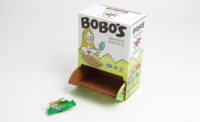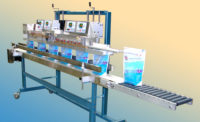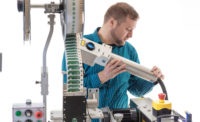Sustainability has become a major driver in the development and application of new packaging materials used in the bakery and snack market along with advances that extend shelf life. “Going green” is the mantra of virtually every product launch.
Sealed Air, Charlotte, NC, recently entered a partnership with Kuraray to manufacture the first packaging material in North America made from Plantic plant-based resin and post-consumer recycled plastic. The company has invested in a new production line in Simpsonville, SC to produce this combination of renewable and recycled content.
Plantic is applicable to the bakery industry for modified-atmosphere packaging (MAP). When paired with Sealed Air’s Active Barrier packaging, it can extend shelf life to 40+ days while reducing waste and the need for costly frozen distribution. “Sustainability benefits are achieved through the packaging material as well as the reduction in waste and greenhouse gas emissions generated from the frozen supply chain,” says Scott Corey, director of marketing, Sealed Air.
Dow Packaging and Specialty Plastics, Midland, MI, has introduced a down-gauged, heavy-duty shipping sack, enabled by INNATE precision packaging resins. The material is 110 microns thick, a reduction of more than 10 percent, which reduces the amount of material needed without compromising performance.
Dow recently partnered with Bear Naked, using its RecycleReady Technology and RETAIN polymer modifiers to develop a recyclable barrier package for the brand’s granola. The packaging qualifies for the How2Recycle label and the Sustainable Packaging Coalition’s Store Drop-off program.
“The demand for clean-label foods without preservatives and additives poses challenges to keep food items fresh, which requires packaging with strong barriers and hermetic seals,” says Holly Dunnill, market director, Dow. “We work with customers to use RETAIN polymer modifiers to achieve strong barrier performance, even in some RecycleReady Technology applications.”
Paper options
Fischer Paper Products, Antioch, IL, has introduced a line of sustainable products called TruKraft. The 17 items include various sized bags for handheld foods such as pretzels, pastries and bread. Made from bio-based plant material, TruKraft is recyclable and compostable. “The bags are manufactured from FDA-approved papers and films, vegetable-based adhesives and water-based inks,” says Bill Fischer, vice president of marketing and service.
Fischer Paper Products also is promoting glassine, a material that’s been around for a long time. “In a sense, it is the purest form of paper with no chemicals but it provides grease-resistance and visibility to the product inside. Glassine does not extend shelf, but for a quick look at checkout to see how many muffins are in the bag, it does the trick,” Fischer says.
WestRock, Atlanta, has unveiled a broad range of renewable, sustainable products that help brands improve their sustainability by reducing usage of fossil fuel–based materials while providing the protection and barrier properties required in snack and bakery applications. “For instance, our EnShield family of products provides up to Kit 12-level oil and grease resistance along with white or brown paperboard options as a sustainable alternative to plastic clamshells for bakery applications,” says Jeremy Keenan, vice president of marketing, consumer packaging.
Consumers engage with sustainability issues, and snack and bakery producers have responded by working to minimize the environmental impact of their products via creative packaging, Keenan adds. “This trend creates a need for new and improved ways to make paperboard packaging, a renewable resource, resistant to water, grease and temperature, while retaining its recyclability and reducing overall package weight and material usage.”
Sustainability also is a key component of the latest zippers and slider systems. Presto Specialty Products, Appleton, WI, has introduced The Fresh-Lock 8000 Series, which is designed to help brands and converters achieve sustainability in support of a more circular economy. The zippers and slider systems are made with resins that are compatible with recyclable films and allow the entire package to be recycled at store drop-off locations.
“If snack and bakery brands want to achieve sustainability with flexible packaging, they need to consider the entire package, which means identifying partners and suppliers who can provide the right materials, including films, adhesives, labels and closures,” says Thomas Morsheimer, Fresh-Lock market development manager, Presto Specialty Products.
Sealstrip Corp., Gilbertsville, PA, has expanded its materials line to include many offerings with direct food contact compliance (USA and EU). The company also utilizes a variety of substrates with different barrier properties to enhance shelf life, according to Heather Chandler, president. “We have compostable PLA—a fully biodegradable thermoplastic polymer consisting of renewable raw materials—substrates available,” she says. “However, over the last several years, compostable packaging has lost momentum. Many of our products meet consumer packaged goods (CPG) sustainability objectives. In fact, Sealstrip products use less plastic than other reseal products. This helps meet the sustainability goals for the entire package—ranging from a press-to-close zipper or slider to a pressure-sensitive tape solution.”
Active packaging
Active packaging technologies that are designed to extend product shelf life continue to advance, offering snack and bakery producers many advantages in the marketplace. MAP solutions are big part of this initiative.
Messer Americas, Bridgewater, NJ, has developed a range of application-specific MAP solutions. One of the largest industrial gas companies in North and South America, Messer Americas came to market March 1, 2019, following acquisitions from Linde plc by Messer Group and CVC Capital Partners.
Messer Americas has developed a range of MAP gas solutions targeted at the challenges facing dry snack and bakery specialists. The company offers this example: In the case of Danish pastries and other iced bakery products, excessive levels of CO2 can adversely affect the appearance of the icing by dissolving into the fat. But, if the CO2 concentration is balanced with nitrogen, the product’s appearance remains unchanged. Also, combining this approach with a barrier material provides even greater protection against loss or adsorption of moisture.
Andrew Manly, communications director, Active & Intelligent Packaging Industry Association, Utrecht, The Netherlands, says progress continues in the development of antimicrobial flexible packaging that incorporates nanomaterials, with tests on bakery and bread products extending shelf life considerably. He says the active polymer films developed by NanoPack present an effective antimicrobial and barrier technology, often derived from natural sources such as essential oils.
“MAP is still a highly effective and cost-effective way to preserve baked goods and snacks,” says Manly. For some applications, vacuum skin packaging can incrementally improve performance.
Researchers at Purdue University, West Lafayette, IN, have developed a process that may change the way some foods are packaged. The Purdue team, led by Jeffrey Youngblood, a professor in its school of Materials Engineering, has created a manufacturing process using cellulose nanocrystals (CNCs) as advanced barrier coatings for food packaging.
CNCs are an alternative renewable raw material derived from abundant resources, such as wood and plants. Their properties include non-toxicity, biodegradability, high specific strength, high thermal conductivity and optical transparency, all of which make them excellent components for advanced food packaging, the university reports.
The new technique reportedly is scalable because it is a roll-to-roll manufacturing process that uses waterborne polymer systems. “The challenge for the food packaging industry is to create a recyclable and sustainable barrier material that is low-cost,” Youngblood says. “Our innovation using CNC coatings is transparent, non-toxic and sustainable.”






